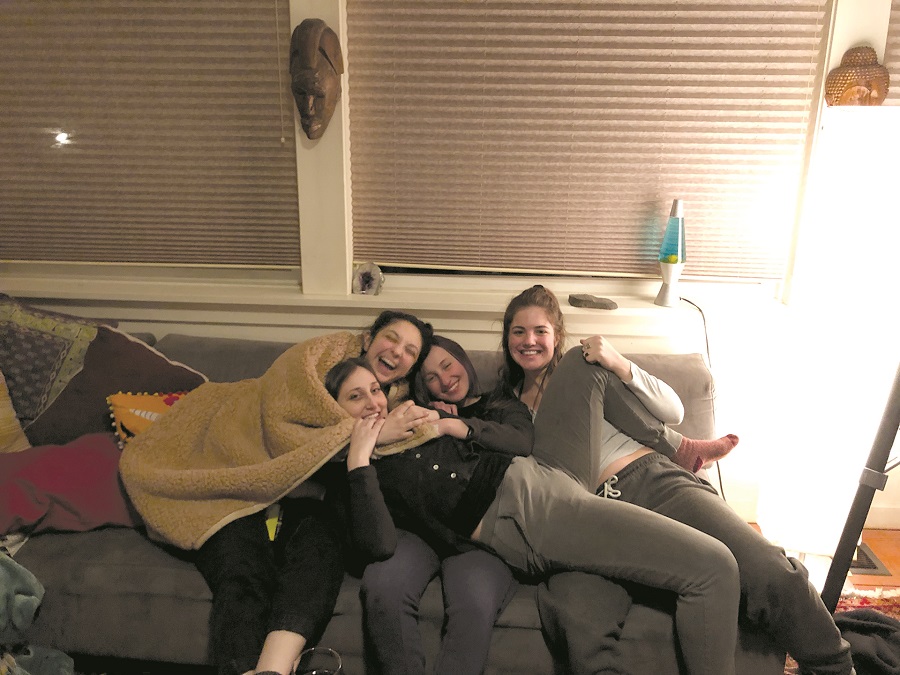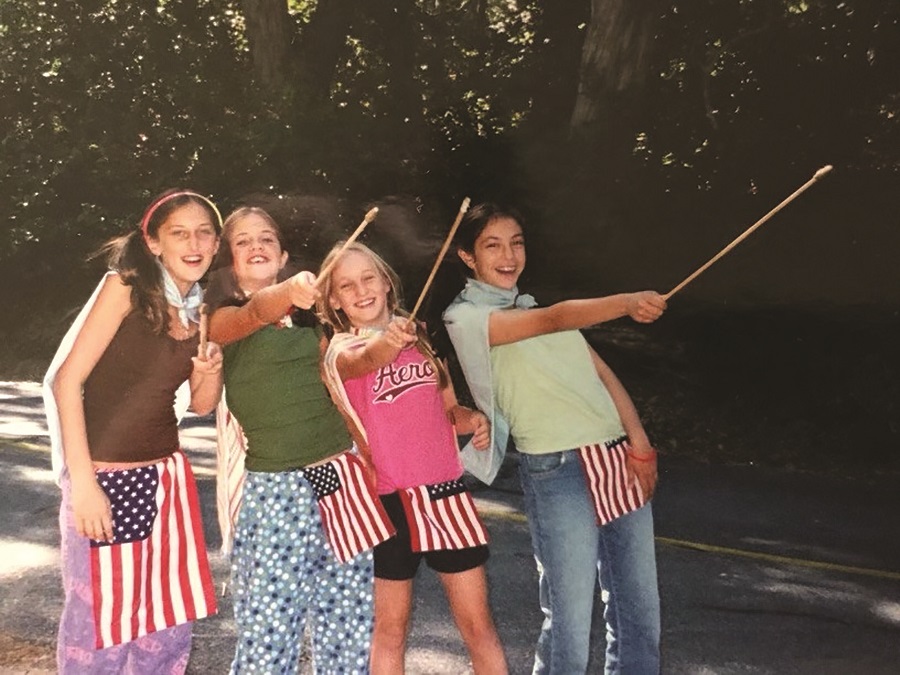WELLFLEET — When Hanna Morse, Emer Valdez, Charlotte Goldberg, and Leah Puffer were kids in Wellfleet, they spent as much time together as they could. They made crafts, played dress-up, and debated who had the best homeroom at Wellfleet Elementary School, or whose house to hang out at after school.
Now, those kids are 26- and 27-year-old women. And they’ve traded Wellfleet for Medford, where they share an apartment. They still play dress-up sometimes — they’ve turned an extra bedroom into a sewing-machine craft space. And they still argue.

“But we have adult fights,” said Puffer.
“About watering the plants, what rug we’re going to put in the living room, how to organize the craft room,” added Morse.
“And,” interrupted Goldberg, “when to turn on the heat!”
This year has introduced a slew of new terms into our collective vocabulary — “social distancing,” “superspreader,” and “pod” among them. A pod (or a “bubble”) unites a group under one roof where they can interact maskless because they’ve agreed to follow strict rules that limit their exposure to others. Pods have provided relief from isolation, especially for young people unburdened by spouses, children, and careers.
Which is precisely how to describe Morse, Valdez, Goldberg, and Puffer. All born and raised in Wellfleet, the four graduated from Nauset High School, then went their separate ways, seeking jobs and education off Cape.
The beginning of 2020 saw the four friends in constant touch, but decidedly spread out. Puffer and Goldberg lived together in Brooklyn, Puffer working as a per-diem psychiatric nurse, and Goldberg as a fashion merchandiser. Morse was working for Lower Cape TV in Wellfleet. Valdez was in London, pursuing a master’s degree and living with housemates she didn’t really know.
Then, the pandemic struck. The world was shuttered, and, one by one, said Puffer, although the friends were in different places, doing different things, each realized she was eager for a change. The bottom line, said Morse, was this: they were “lifelong friends, in similar situations in life.” Covid gave them an opportunity to regroup, reassess, and reset.
Plus, the women realized something that most Americans didn’t, when it came to Covid. “We felt like the pandemic was going to go on for a long time,” said Goldberg. “It made sense to be in the same place to help each other out and get through it together.”
They found a perfect blend of urban and rural (and, added Morse, “cheaper than South Boston”) in Medford. In September, the four signed a 12-month lease on a five-bedroom apartment in the top half of an early 20th-century townhouse.
And, just like that, said Puffer, the four became a pod. “It’s a cliché, but the universe did its thing, and it all fell together,” she said.
What does it mean to be a pod on a day-to-day level? That’s a little more complicated.
Pulling off a successful pod requires laying down some serious protocols. The women have friends nearby, but have all agreed not to visit anyone in their homes. Bars in Medford are open, but the friends don’t let themselves go. They eat only at restaurants that offer outdoor dining.
And dating? That’s a whole other can of worms. Puffer and Goldberg have significant others living in New York City; they get tested before seeing one another. Morse and Emer say the dating game is pretty bleak. “It’s not a great time to be meeting brand new people,” said Morse. “We’re still trying to figure out how to date responsibly during a pandemic.”
According to the pod, the public outlook on Covid safety feels stricter in Medford than on the Cape. Except at bars, “the amount of mask-wearing and distancing is usually at 100 percent,” Morse said. “It may be due to the larger population and higher cases, but people police each other a lot more.”
While unemployment remains a major issue as the pandemic stretches on, the four have found some luck living outside of Boston. Puffer is still a nurse, doing mostly from-home telehealth. Goldberg makes jewelry for an Allston-based Etsy company, and Morse just started an office job at Granite, a Quincy telecommunications firm. With her studies completed remotely, Valdez is now searching for a job in the museum sector, which she admits “isn’t in the best shape right now.”

The women’s lease ends in September 2021. With it will end a year of togetherness that, in spite of their childhood friendships, none of them imagined for this time in their lives. Then what?
“I would love to come back to the Cape,” said Valdez. “If I can ever afford it.”
“In terms of putting down roots, we all definitely want to go back to the Cape,” said Goldberg. “But like most of the younger generations who grew up there, we’re afraid it’s not a reality.” The four women agree that both affordability and available housing are roadblocks for Cape kids wanting to live in their home towns.
Reality, though, hasn’t stopped the women from spending some of their pod time dreaming. For the last few months they’ve shared meals, laughs, air particles, and ideas.
“Our big dream is to eventually start a women’s center in Wellfleet,” said Morse. “It would be a place for all kinds of activities — workout classes, child care, shared workspace, and classes about stuff they don’t teach you in school, like personal finance, health care, and home ownership.”
“It would be an inclusive, safe space,” added Puffer, “to enrich the lives of all types of people.”
They know that pulling off their dream wouldn’t be easy. But it’s one that’s inspired by their experience of closeness — as kids on the Wellfleet Elementary School playground, and now, getting through the pandemic together.
“We thought it was us against the world,” Morse said. “Two decades and a pandemic later, it still pretty much is.”



